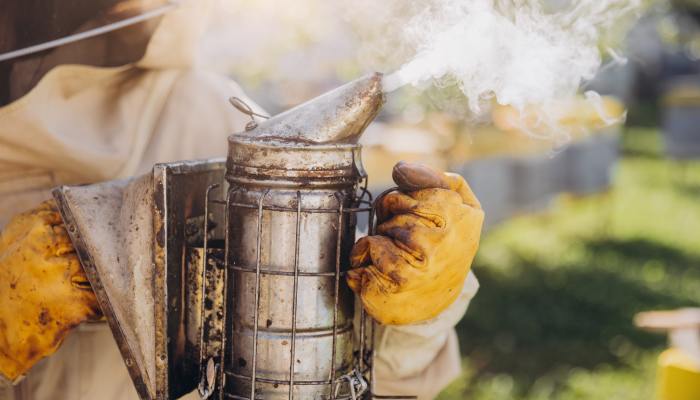Whether you’re a seasoned beekeeper or someone interested in starting your own hive, understanding the tools that make beekeeping safer and more effective matters. The bee smoker is one of the most essential pieces of equipment in any beekeeper’s toolkit, yet many newcomers wonder if they truly need one.
A bee smoker serves as your primary defense mechanism when working with bees, creating a calming effect that makes hive inspections and honey harvesting significantly safer. This simple yet ingenious device helps beekeepers maintain their colonies while minimizing stress for humans and bees. So what is a bee smoker and do you need one? We have the answers below.
What Is a Bee Smoker?
A bee smoker consists of three main components: a fire chamber, a bellows system, and a spout. The fire chamber holds smoldering materials like wood chips, pine needles, or burlap. The bellows pump air through the chamber and create consistent smoke production. The spout directs this cool smoke precisely where you need it during hive work.
Most smokers feature stainless steel construction for durability and heat resistance. The bellows typically use leather or synthetic materials that withstand repeated compression. Quality smokers maintain steady smoke production for extended periods, giving you reliable performance during lengthy hive inspections.
How Bee Smokers Work
Smoke triggers a natural survival response in bees. When they detect smoke, bees instinctively prepare for potential forest fires by consuming honey to fuel potential relocation. This feeding behavior makes them less aggressive and less likely to sting, as they focus on protecting their food stores rather than defending against perceived threats.
The smoke also masks alarm pheromones that guard bees release when they sense danger. Without these chemical signals spreading throughout the colony, worker bees remain calmer during your hive activities. Cool smoke works best, as hot smoke can harm or agitate the bees.
Benefits of Using a Bee Smoker
Using a smoker reduces your risk of stings dramatically, making beekeeping accessible to people with sting sensitivities. The calming effect allows you to perform thorough hive inspections without rushing, leading to better colony management and healthier bees.
Smokers also minimize stress on your bee colony. Less agitated bees continue their normal activities soon after inspections, maintaining productivity and reducing disruption to brood development. This gentler approach supports stronger colonies that produce more honey and provide better pollination services.
Do You Need a Bee Smoker?
New beekeepers absolutely need smokers for safe hive management. Even experienced beekeepers who work without protective gear rely on smokers for challenging situations like aggressive colonies or emergency interventions.
Consider your local bee population and climate when deciding. Africanized honeybees or colonies under stress from environmental factors require smoker use for safe interaction. Urban beekeepers often need smokers more frequently due to limited space and closer neighbor proximity.
Choose the Right Equipment
When selecting equipment, the features to consider when buying a bee smoker include chamber size, bellows quality, and construction materials. Larger chambers burn longer but require more fuel preparation. High-quality bellows provide consistent airflow with less effort. Stainless steel construction offers durability and easy cleaning.
So to answer your question of what a bee smoker is and if you need one? Yes, you do; it’s a vital tool in safe, effective beekeeping. Start with a quality smoker from the beginning, and you’ll find beekeeping more enjoyable and successful.







